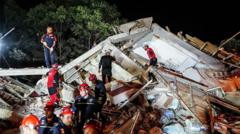On Monday, Iran targeted a US military base in Qatar with missiles, stating it was retaliation for recent US attacks on its nuclear program. While no casualties were reported, both US and Iranian leaders expressed contrasting views on the incident, highlighting the fragile geopolitical landscape in the region.
Iran's Missile Strike on US Base in Qatar: Escalating Tensions in the Middle East

Iran's Missile Strike on US Base in Qatar: Escalating Tensions in the Middle East
Iran launched missiles at the Al-Udeid military base, claiming retaliation against US airstrikes on its nuclear facilities, prompting varied international responses.
Iran has fired missiles at the Al-Udeid airbase in Qatar, the largest US military installation in the Middle East, marking a significant escalation in military tensions following recent US strikes on Iranian nuclear facilities. Witnesses in Doha reported loud bangs and saw bright flashes as air defense systems undertook interception efforts, with the attack initially confirmed by Iranian state media.
Iran's Islamic Revolutionary Guard Corps (IRGC) stated the attack served as a response to US airstrikes that targeted Iranian nuclear sites over the weekend. However, the number of missiles launched has been the subject of conflicting reports: Iran claims six missiles, while the US stated there were 14, and Qatar's official sources cited 19, all of which they said were intercepted. Importantly, there have been no reported injuries or fatalities from the strikes.
Hours preceding the missile strike, the United States and the United Kingdom advised their citizens in Qatar to shelter in place, indicating a credible threat. Reports indicate that Iran had warned Qatar of impending action to minimize civilian casualties. President Donald Trump later acknowledged this warning, praising it for preventing loss of life and suggesting the attack was a weak response.
The response to the Iranian missile strike has varied across the spectrum. Trump criticized the attack as weak but simultaneously expressed hope for peace moving forward. In contrast, Qatar's foreign ministry labeled the missile strike a "flagrant violation of its sovereignty," reflecting increased regional tensions. The supreme leader of Iran, Ayatollah Ali Khamenei, also emphasized that Iran would not tolerate any outside aggression while asserting the necessity to defend its sovereignty.
Amid this precarious situation, Trump announced a ceasefire agreement between Israel and Iran just a day after the attack. Israel has publicly accepted the ceasefire terms while warning Iran that it will react decisively to any breaches of this temporary peace. The unfolding events post-attack underline the ongoing volatility in Middle Eastern geopolitical dynamics, with increasing scrutiny over Iran's nuclear ambitions and military responses from the US and its allies.
Reports indicate that the regional airspace was temporarily closed, and flight diversions occurred in response to the threat, emphasizing the broader implications of military actions between these nations. As the international community watches closely, the boundaries between military action and diplomatic negotiations remain tenuous, deepening concerns about future confrontations in the region.






















